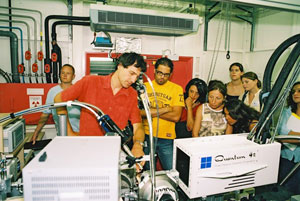- Home
- News
- General News
- The Third Younger...
The Third Younger European Chemists Conference Brings Together 140 Scientists
02-09-2003
|
They are young, European and chemists. The celebration of the Third Younger European Chemists' Conference at the ESRF afforded 140 scientists the opportunity of meeting other colleagues with similar aims and interests. |
|
Despite the shutdown, the ESRF was very busy last week. The Third Younger European Chemists' Conference took place in the facility, bringing together 140 scientists, mainly from 21 to 35 years old, from all over Europe. Why the ESRF? The choice was not made randomly. According to Dr. Eric Wharton, organizer of the Event, the ESRF "represents a great example of international collaboration in science and gives these young researchers the chance to learn how countries get together to create such a facility". The main purpose of this event was to encourage greater interaction, networking and communication between scientists. At the end of the three-day conference, several awards were given, among them the Europa Medal for the most outstanding research work. The award went to the student Martin Pavlik, of the Institute of Macromolecular Chemistry of the Czech Academy of Sciences, for his work on solid state solar cells based on electrophoretically-deposited polymer nanocomposites. |
 |
 |
|
|
Life despite the shutdown: This is how the hall looked like during the three days of conference last week. |
Some of the participants listen to the explanations of the scientist Dominique Bourgeois when visiting ID14. |
|
The programme included several short talks and keynote talks about subjects such as the plastic industry and the role of polyolefins, the use of synchrotron light for structural chemistry and biology and the future of chemistry in Europe. There was also time for some entertainment by Peter Joyce, an English artist who presented a comedy about Newton and his science. A show with "a lot of humour", according to a spectator, and which was "very entertaining because he made the audience participate".
This annual conference, partially funded by the European Commission, is organised by SET (Science, Engineering and Technology) for EUROPE, an institution established in 1999. Previous conferences were held in Heidelberg (Germany) and London (U.K.). |



